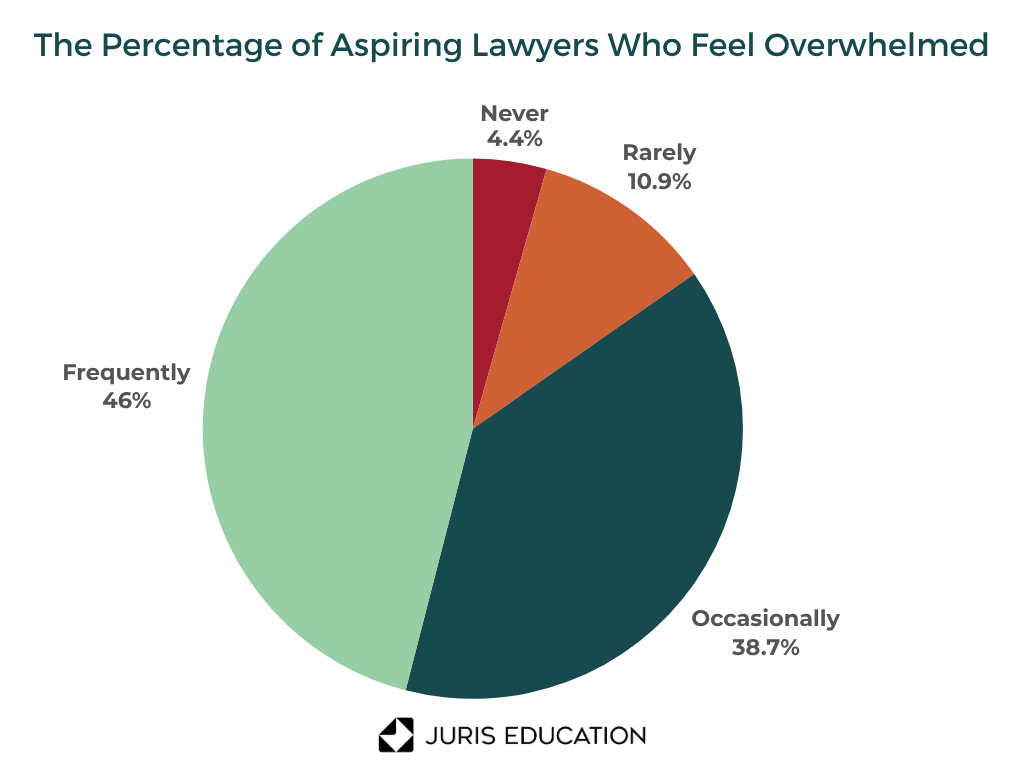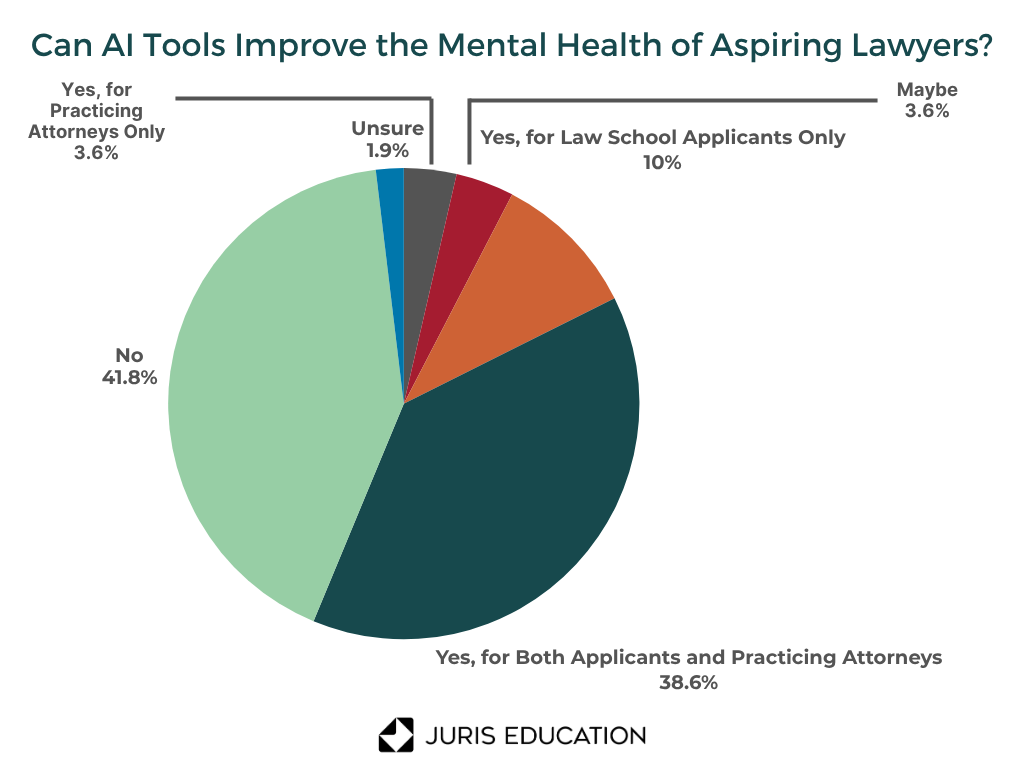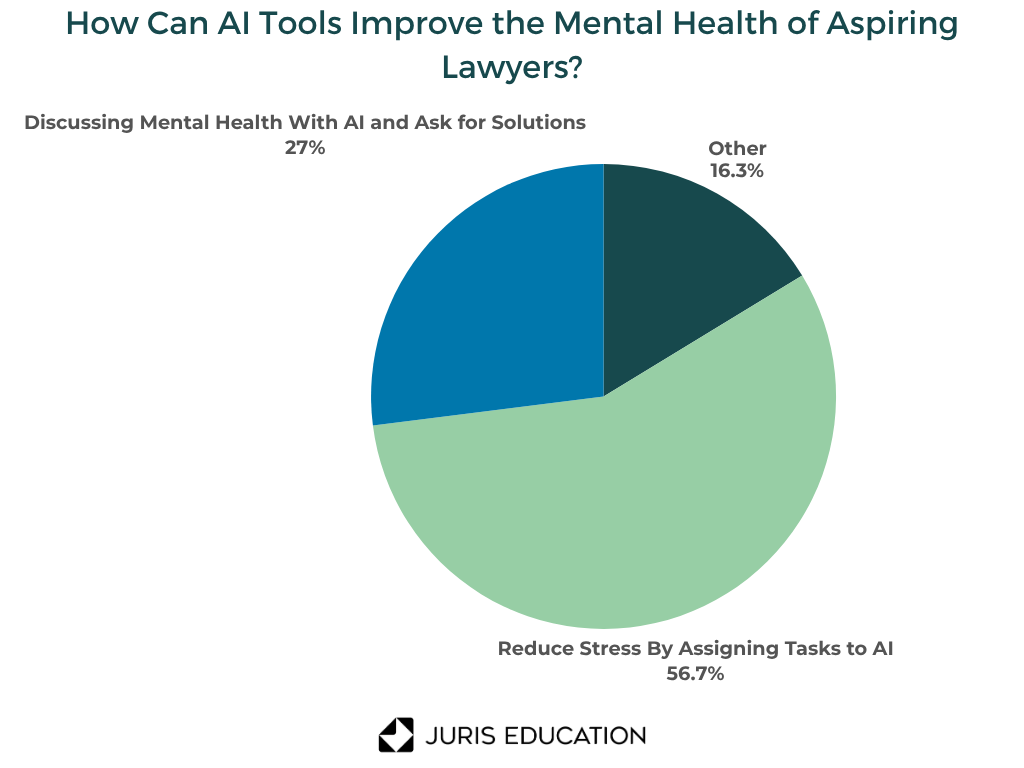Get in touch: +1 888 904 4161


NEW YORK, NY — October 30, 2025 — A new survey conducted by Juris Education reveals that almost 40% of aspiring lawyers don’t feel comfortable sharing sensitive mental health or personal details with AI, yet almost 13% said they do it anyway.
The survey, which interviewed 248 aspiring lawyers, was conducted by Juris Education, a law school admissions consulting firm, to understand the concerns about sharing sensitive mental health-related details with an AI chatbot. The respondents answered the survey anonymously through a Google Form.
Juris Education is a law school admissions consulting firm that helps students navigate the law school application process. Their team of former admissions officers and admissions experts from top law schools has over 15 years of experience.
In the survey, Juris Education asked aspiring lawyers how often they feel overwhelmed by law school-related stress or anxiety. Nearly 46% of respondents reported feeling “frequently” overwhelmed.
Additionally, close to 38.7% of respondents reported feeling “occasionally” overwhelmed, while 11% said they “rarely” felt overwhelmed. Only 4.4% of aspiring lawyers said they “never” felt overwhelmed.

In the survey, Juris Education asked aspiring lawyers if they ever felt the need for therapy during the law school application process. Nearly 34.7% of respondents said they “sometimes” considered seeking therapy during the application process. Alarmingly, almost 31% of respondents “never” considered therapy during the application cycle, despite 46% of them feeling frequently overwhelmed.
Interestingly, 18.5% of respondents said they considered therapy “very often” throughout the application process. Only 15.7% of respondents “rarely” considered therapy during the application cycle.

According to Juris Education’s survey, nearly 40% of aspiring lawyers said they have never shared sensitive mental health-related issues with AI chatbots and don’t plan on it in the future. On the contrary, close to 17% of the aspiring lawyers said they are “very comfortable” sharing sensitive mental health-related issues with AI chatbots.
Around 15.3% of aspiring lawyers said they “don’t mind sharing these details, but never tried.” Only 14.9% of future lawyers said they’re on the fence, noting “somewhat comfortable” in the survey. Interestingly, 12.9% of aspiring lawyers said that they are not comfortable sharing sensitive details with AI but do it anyway.

Juris Education’s survey asked aspiring lawyers if they think using AI tools can help improve their mental health while preparing for law school and once they enter the legal profession. An overwhelming 41.8% of respondents admitted that they didn’t think AI could help improve their mental health as applicants or as practicing attorneys. However, 38.6% of respondents advocated for AI being a helpful support system for applicants and attorneys.
Jesse Wang, senior admissions consultant at Juris Education and NY attorney, explained why applicants might be using AI. “Some attorneys may find AI to be helpful for preliminary, surface-level legal research and administrative work, such as rephrasing emails or tightening sentences. Research has shown that routine non-substantive tasks can drain psychological resources and contribute significantly to burnout among attorneys. When used thoughtfully and in accordance with firm policies and professional regulations, AI can support mental well-being by lightening the cognitive load of routine tasks,” Wang said.
Only 10% of respondents said they think AI can improve their mental health in the application process, but not as practicing attorneys. On the other hand, 3.6% of respondents believe AI can improve their mental health, but only when they’re practicing attorneys.

For the aspiring lawyers who responded “yes” to AI improving their mental health, Juris Education asked how they think the use of AI tools in the legal field can support their mental health. Overwhelmingly, 56.7% of those individuals said AI can improve their mental health by assigning tasks to it. Only 27% of respondents admitted that they think discussing mental health with AI chatbots can lead to solutions.
However, 16.3% of respondents marked “other,” with many noting uncertainty about how AI can improve their mental health.

According to the 248 respondents in Juris Education’s survey, nearly all aspiring lawyers (96%) experience at least occasional overwhelm, and about 70% have considered therapy. However, 52.8% feel uncomfortable or opposed to sharing sensitive mental health details with AI, and 12.5% used AI despite their discomfort.
"We're seeing a cohort of students who are engaging with AI tools regularly," said Arush Chandna, co-founder of Juris Education. "The 31.8% who report at least some comfort sharing sensitive information suggests that a meaningful segment of future lawyers are already integrating AI into their workflows."
According to the American Bar Association (ABA), in the 2025 Legal Technology Survey Report, 31% of practicing lawyers are already using AI tools. The report also highlights that 39% of firms with 51 or more attorneys use AI, compared with 20% of smaller firms with 50 or fewer layers.

"What we're seeing is an acceleration," Chandna explained. "Practicing lawyers are deploying AI at scale, and students are watching this unfold. They're entering a profession where AI is a reality. The disconnect between their comfort level and the reality of the field is significant."
The Juris Education survey provides a baseline for understanding how aspiring lawyers currently view AI and data privacy. With AI adoption accelerating in law firms and AI instruction expanding in law schools, these attitudes might evolve further.
Even with the rapid AI integration into the legal field, one must exercise caution and use it responsibly, Wang said.
“Ultimately, AI in the practice of law right now is still in its nascent stage, as privacy concerns, such as protecting proprietary information or privileged materials, remain a major reason for hesitation in adopting AI within the legal field. Still, there is room for gradual improvement and responsible integration, and those who dismiss AI entirely may ultimately fall behind peers who approach it with greater openness," Wang added.
Juris Education is a law school admissions consulting firm that helps students navigate the law school application process. Their team of former admissions officers and admissions experts from top law schools has over 15 years of experience.
